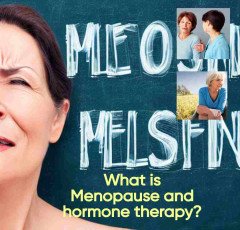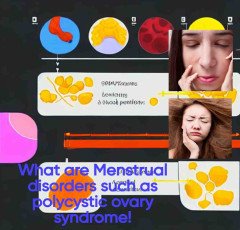
What are Menopause and hormone therapy?

A natural biological process called menopause usually starts for women around the age of 50. When a woman enters menopause, her ovaries stop producing
eggs and her body produces less estrogen and progesterone, which causes a number of physical and psychological changes.
Hot flashes, vaginal dryness, mood swings, and sleep difficulties are just a few of the symptoms of menopause that can be treated medically with hormone therapy, generally known as hormone replacement therapy (HRT).
In order to replace the hormones that the body is no longer making, hormone treatment entails taking estrogen and/or progesterone in the form of pills, patches, creams, gels, or vaginal suppositories.
For some women, hormone therapy can help with menopause symptoms and osteoporosis prevention.
It is not advised for all women, though, as it could raise the risk of certain illnesses like blood clots, stroke, and breast cancer.
A woman's medical history and general health should be taken into account when deciding whether to use hormone therapy on an individual basis in conjunction with a healthcare professional.
Estrogen-only therapy (ET) and combination therapy (ET with progesterone) are the two different types of hormone therapy.
For women who still have a uterus, combination therapy is typically advised because estrogen use alone can raise the risk of endometrial cancer.
Progesterone can be added to assist lower this risk.
There are numerous ways to receive hormone therapy, including pills, patches, lotions, gels, vaginal rings, and oral solutions.
The woman's tastes and needs determine the form to be used.
Being aware that hormone therapy is not a universally effective treatment.
Hormone therapy may not be an option for women who have a history of certain illnesses, such as breast cancer or blood clots.
Women who are thinking about hormone therapy should talk to their doctor about the possible dangers and advantages and schedule regular checkups to evaluate their health.
In addition to hormone therapy, there are various methods of treating menopause symptoms, such as dietary adjustments, over-the-counter pharmaceuticals, and prescription drugs. To identify the best course of treatment for their particular requirements, women should discuss all of their options with their healthcare professional.
Regular exercise, a nutritious diet, stress-reduction strategies, and avoiding triggers that can exacerbate
symptoms (including caffeine, alcohol, and spicy foods) are a few lifestyle modifications that can help with menopause symptoms.
For some ladies, over-the-counter medications like herbal supplements and vitamins may also be beneficial.
It's crucial to keep in mind that these treatments may not be safe or effective for all people and are not FDA-regulated.
Menopause symptoms like hot flashes and mood swings can also be treated with prescription drugs like antidepressants.
These drugs function by changing the concentrations of specific brain chemicals that control mood and body temperature.
A natural biological process called menopause usually starts for women around the age of 50.
Because of the potential hazards, hormone therapy is not advised for all women who are experiencing menopausal symptoms.
Women should talk to their doctor about their options and take various forms of treatment into consideration, including
dietary changes, over-the-counter medications, and prescription drugs.
Additionally, it's crucial for women to continue getting regular health exams and screenings both throughout and after menopause.
This covers mammograms, measurements of bone density, and other exams that their doctor may advise.
Menopause may have long-term repercussions on some women, including a higher risk of osteoporosis and heart disease.
Women should discuss with their doctor how to lower their chance of developing these disorders, including keeping a healthy lifestyle, taking vitamins or medications as directed, and having regular examinations.
Menopause is a normal part of aging, and while it may cause some unpleasant symptoms, there are numerous therapies and dietary modifications that can help reduce them. To determine the best strategy for their particular needs and to make sure they remain healthy both throughout and after menopause, women should consult carefully with their healthcare professional.
Menopause can be a major shift for women, both physically and mentally, and this should be noted. During this time, some women may feel depressed, anxious, or lost. In addition to maintaining good physical health, women should also care for their emotional wellness.
Women who are going through the menopause may find it beneficial to talk to friends, family members, or a therapist.
Women can find a secure and encouraging environment to discuss their experiences and make connections with others who are going through similar experiences by joining a support group.
Menopause is a biological process that occurs naturally and signifies the end of a woman's fertile years.
Although not all women should use it, hormone therapy can help to reduce menopause symptoms. Women should talk to their doctor about their options and take various forms of treatment into consideration, including dietary changes, over-the-counter medications, and prescription drugs.
Along with maintaining their emotional health both throughout and after menopause, women should continue to have routine health exams.
More importantly, it's crucial to remember that menopause might affect a woman's sexual health.
Vaginal dryness, discomfort during sex, and a diminished sex drive can all be caused by a decrease in hormone production. Women should discuss these issues and potential treatments with their healthcare professional.
A woman's whole quality of life, including her sleep, emotions, and energy levels, can also be impacted by menopause.
Women should prioritize self-care and take action to control their symptoms. This can entail using breathing exercises, exercising frequently, having a balanced diet, and getting adequate sleep.
Women need to be aware that menopause is a typical and natural aspect of aging.
It may present certain difficulties, but it also heralds the start of a new phase in a woman's life. Women may move through this change with grace and confidence if they have the correct resources and support.
The menopause, a biologically normal process, signals the end of a woman's fertile years.
It is accompanied by a range of physical and psychological symptoms that can be controlled with hormone therapy, lifestyle modifications, over-the-counter medications, and prescription drugs.
Women should prioritize their physical and emotional health both before and after menopause and work closely with their healthcare practitioner to establish the best course of action for their particular requirements.
Women can effectively negotiate this transition and lead healthy, satisfying lives with the correct support and services.
It's also important to note that menopause can have varying effects on women.
While some women may experience significant symptoms, others might go through the shift rather smoothly. There may be a connection between underlying medical issues, lifestyle choices, and genetics.
To be aware that menopause does not signify the end of their ability to reproduce sexually or otherwise.
After menopause, a woman's fertility decreases, although she can still get pregnant. Women should keep up safe sexual behavior and, as necessary, talk to their doctor about contraception alternatives.
Menopause is a normal stage of aging that can present possibilities as well as obstacles.
Women can effectively negotiate this transition and maintain a satisfying life after menopause by keeping aware and proactive about their health.
It's crucial to recognize that each woman's experience of menopause is different.
Some women may get symptoms suddenly, while others might see a gradual change. From one woman to the next, symptoms might differ widely in intensity and length.
Menopause can have emotional and psychological repercussions in addition to the physical ones.
In women, mood fluctuations, despair, anxiety, or a sense of loss are all possible. During this time, it's crucial for women to
have support and care for both their physical and emotional wellbeing.
In addition, it should be noted that hormone therapy is not the only option for treating menopause-related symptoms.
Women can experiment with a variety of lifestyle modifications that can aid with symptom relief, including as exercise, stress management strategies, and a nutritious diet. To help treat particular symptoms, a variety of over-the-counter medicines and prescription drugs are also available.
A woman's physical and mental health may be significantly impacted by the complex and unusual experience of menopause.
Women can successfully manage their symptoms and lead healthy, meaningful lives after menopause by staying informed, getting support, and looking into a variety of therapeutic choices.
To be aware that menopause may affect a woman's bone health.
Loss of bone density brought on by the reduction in estrogen production can raise the risk of osteoporosis and fractures.
Women should discuss their bone health with their healthcare provider and look into possible treatments and preventative measures, including calcium and vitamin D supplements, weight-bearing exercise, and pharmaceuticals.
After menopause, women should continue to put their sexual health first.
This include speaking with their doctor about any changes in sexual function or desire and, if necessary, evaluating treatment alternatives.
Women should keep in mind that menopause is a normal and natural phase of aging.
It's nothing to be afraid of or ashamed of, and women shouldn't be afraid to ask for help and support while they go through this transition.
Women can successfully manage their symptoms and lead healthy, satisfying lives after menopause by staying informed, getting assistance, and prioritizing their physical and mental health.
The increased risk of heart disease is another element of menopause to be mindful of.
The risk of heart disease may increase due to changes in blood vessels and cholesterol levels brought on by the drop in estrogen levels. Women should discuss their risk factors for cardiovascular disease with their healthcare provider and look into drugs as well as lifestyle adjustments like exercise and a heart-healthy diet.
In order to protect their general health both during and after menopause, women should also continue to obtain routine preventative treatment and screenings, such as mammograms and Pap tests. They should also be on the lookout for any physical changes and notify their doctor of any alarming symptoms.
It's crucial for women to understand the possible hazards and advantages of hormone therapy.
While hormone therapy is an effective treatment for menopause symptoms, there are certain hazards associated with it, including a higher risk of blood clots, stroke, and breast cancer. Before making a choice, women should discuss the advantages and disadvantages of hormone therapy with their healthcare physician in addition to other possible treatments.
A woman's physical, emotional, and sexual health may be affected by the menopause, which is a complicated and diverse process.
Women can successfully manage their symptoms and maintain their general health during and after menopause by being informed, finding support, and collaborating closely with their healthcare professional.
To point out that menopause affects not only women, but also their spouses, families, and communities.
Women may find it very helpful to have their spouses, families, and friends understand and support them while they go through this transition.
Women's careers and employment can be impacted by menopause.
Menopause symptoms like night sweats and hot flashes might interfere with productivity at work. Women may find it advantageous to discuss working adjustments with their employer or human resources department, such as a flexible schedule or access to a secluded location to manage symptoms.
Should understand that menopause is a normal and healthy aspect of aging that can lead to new chances and experiences.
During and after menopause, women should be encouraged to pursue new hobbies and interests and to give priority to their physical and mental well-being.
Women's physical, mental, and sexual health, as well as their employment and personal lives, can all be affected by the complicated and diverse experience of menopause. Women can effectively negotiate this change and enjoy a healthy and satisfying life after menopause by being informed, getting assistance, and being proactive about their health and wellness.
Every woman will eventually go through menopause; it is a normal and natural part of aging.
Women can successfully negotiate this transition and maintain their general health and wellbeing by being aware of what to anticipate and how to treat symptoms.
For women to remain knowledgeable about the menopause and to communicate openly and honestly with their doctor about their symptoms and available treatments.
In addition to regular exercise, a good diet, stress reduction techniques, and adequate sleep, women should prioritize self-care.
Women should ask their spouses, families, and friends for help, and they shouldn't be afraid to
request reasonable accommodations at work if they do. Women can continue to have happy, healthy, and satisfying lives by being proactive about their health and wellness during and after menopause.
Should assume responsibility for their own health and wellness both during and beyond menopause.
This entails keeping up with potential changes in one's physical, mental, and sexual well-being and, as necessary, seeking help and therapy.
Always keep in mind that menopause is an individual experience.
There is no right or wrong way to handle this transition, every woman will have a unique experience. Women should be encouraged to investigate various therapies and self-care practices to determine what suits them the best.
Women should continue placing a high priority on their general health and wellness, which includes receiving regular
preventive care, leading a healthy lifestyle, and getting medical attention for any emerging health issues.
Women can successfully manage their symptoms and have a healthy and satisfying life during and after menopause by adopting a proactive and tailored approach to their health and wellness.















 The Secret Email System
The Secret Email System  NordVPN
NordVPN  Men Clothing
Men Clothing  Online Marketing
Online Marketing  One World Collection
One World Collection  Acer Laptop
Acer Laptop  SEO Checklist
SEO Checklist  Sennheiser
Sennheiser  Amazon Best Selling Products
Amazon Best Selling Products  Best Sellers On Amazon
Best Sellers On Amazon  RPM 3.0
RPM 3.0  ASPINAL LONDON
ASPINAL LONDON  The Click Engine
The Click Engine  Best Selling Books
Best Selling Books  NordLocker
NordLocker  Online Technology Classes
Online Technology Classes  Favorite Company (Cuelinks)
Favorite Company (Cuelinks)  Hello Theme
Hello Theme  Artificial Intelligence
Artificial Intelligence  Unreal Engine 5 For Beginners Learn The Basics Of Virtual Production
Unreal Engine 5 For Beginners Learn The Basics Of Virtual Production  Best Robotic Vacuum Cleaners
Best Robotic Vacuum Cleaners  Graphics & Design
Graphics & Design  Creative Brief For Video Shoot
Creative Brief For Video Shoot  Smart Doorbell
Smart Doorbell  Only For The United States
Only For The United States  SOFAS
SOFAS  All Wireless Products
All Wireless Products  Hot Bags For Pain Relief
Hot Bags For Pain Relief  ASUS Laptop
ASUS Laptop  Best Home Appliances
Best Home Appliances  NordPass
NordPass  Top Rated From Amazon
Top Rated From Amazon  1150+Trendy kids coloring pages Bundle
1150+Trendy kids coloring pages Bundle  Unlimited access to classes on illustration, photography, design, film, music
Unlimited access to classes on illustration, photography, design, film, music  ELECTRONIC ACCESSORIES
ELECTRONIC ACCESSORIES  Women Fashion
Women Fashion  BEST SELLER TOP10
BEST SELLER TOP10  TitTok Revolution
TitTok Revolution 
















